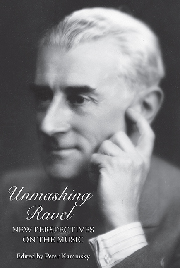Introduction
Published online by Cambridge University Press: 05 September 2013
Summary
In a letter to critic Louis Laloy dated March 8, 1907, Claude Debussy, upon hearing the premier of Ravel's song cycle Histoires naturelles, writes:
I agree with you in acknowledging that Ravel is exceptionally gifted, but what irritates me is his posture as a ‘trickster,’ or better yet, as an enchanting fakir, who can make flowers spring up around a chair. Unfortunately, a trick is always prepared, and it can astonish only once!
In a “Tribute” published in 1933, Ravel's friend and musicologist Michel Dimitri Calvocoressi notes:
He had a marked taste for the recondite, which people who did not know him considered a sign of affectation. He was aware of this, but it did not worry him in the least. One day, however, he said to me, rather impatiently: “Mais est-ce qu'il ne vient jamais à l'idée de ces gens-là que je peux être ‘artificiel’ par nature?” (But doesn't it ever occur to those people that I can be “artificial” by nature?)
The above statements are of course representative tropes in contemporary characterizations of Ravel's music. Significantly, both Debussy and Calvocoressi bring up the crucial idea of artifice. Without denying the grain of validity to their respective statements, it is fair to say that these and related tropes have had inordinate influence on the subsequent course of Ravel scholarship in its entirety and that for the most part, they have not been subject to a thoroughly critical interrogation.
- Type
- Chapter
- Information
- Unmasking RavelNew Perspectives on the Music, pp. 1 - 6Publisher: Boydell & BrewerPrint publication year: 2011



